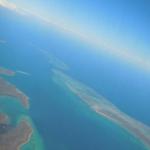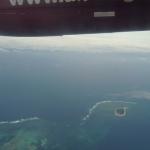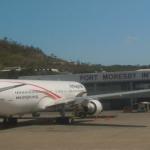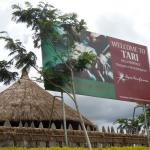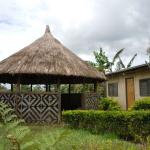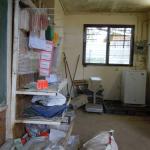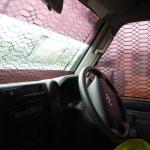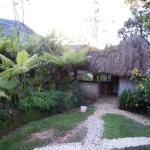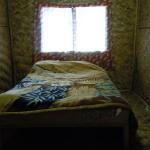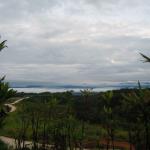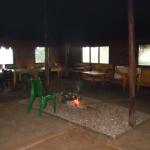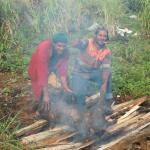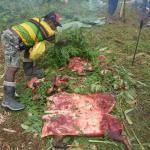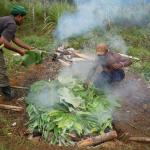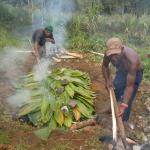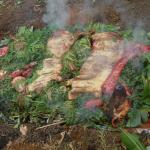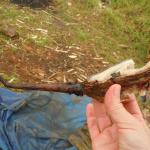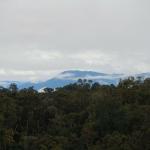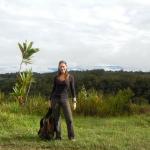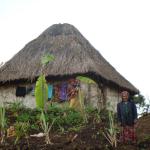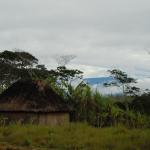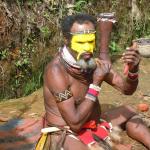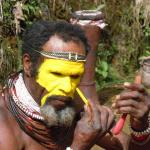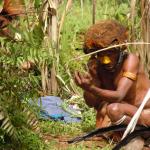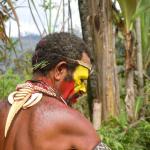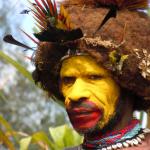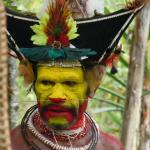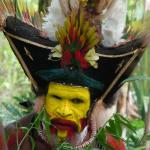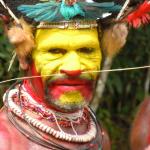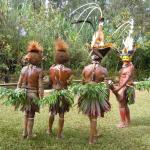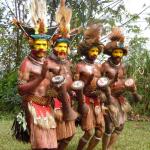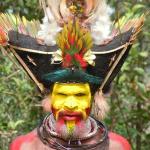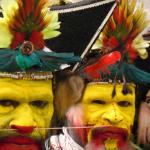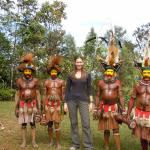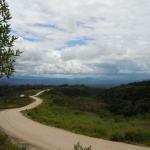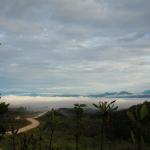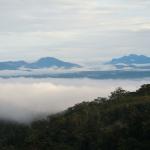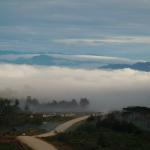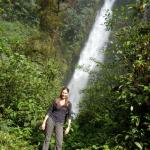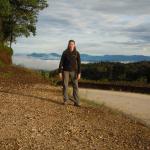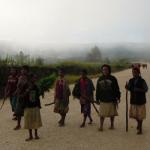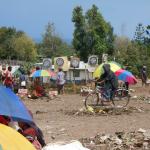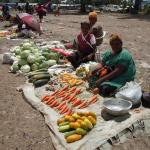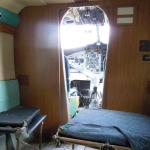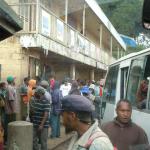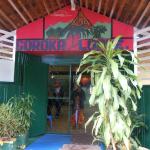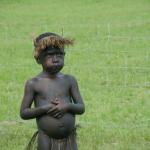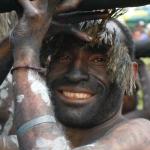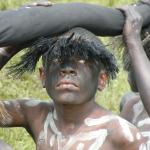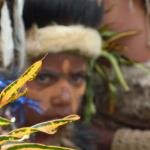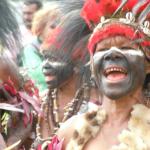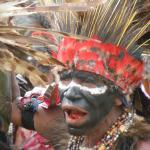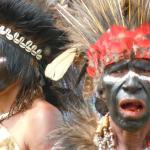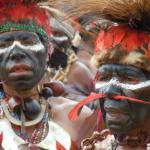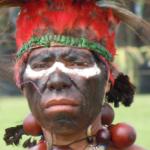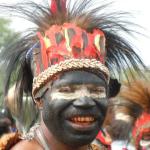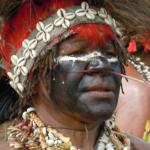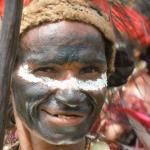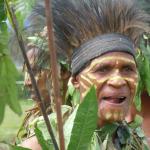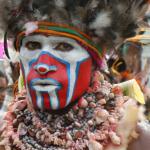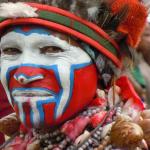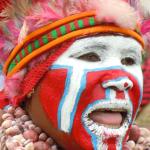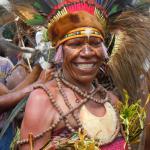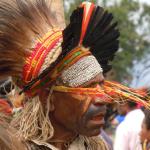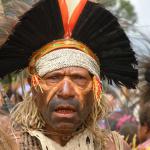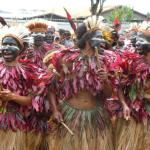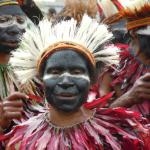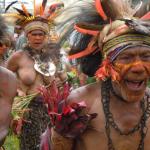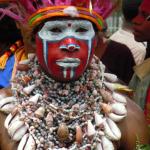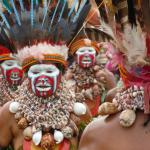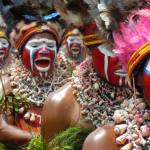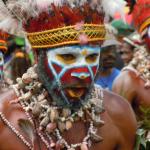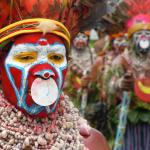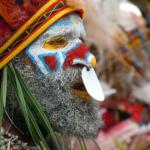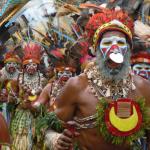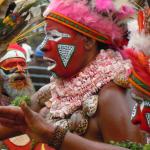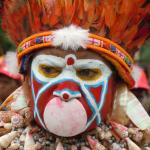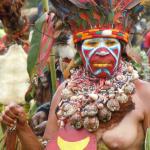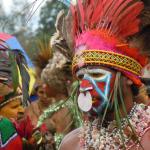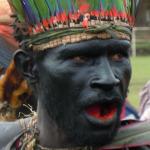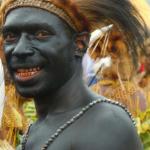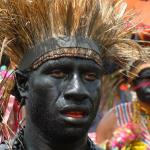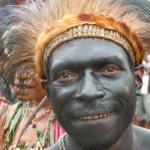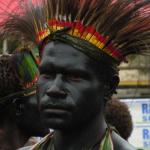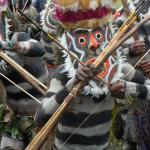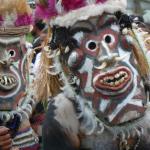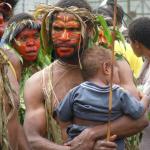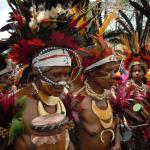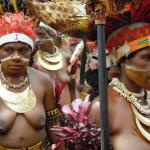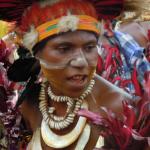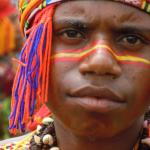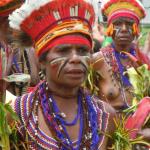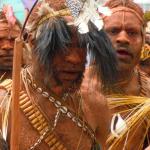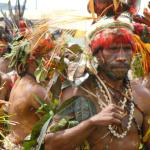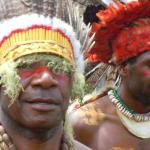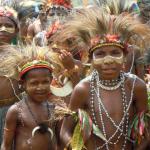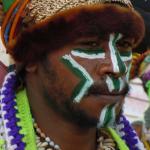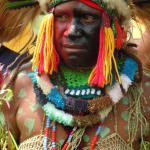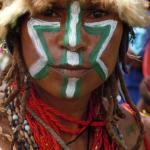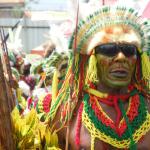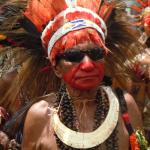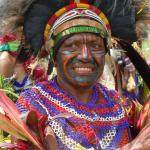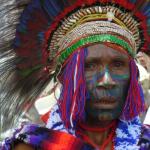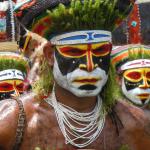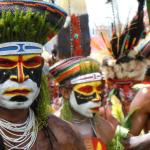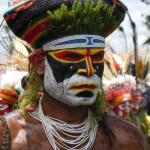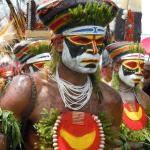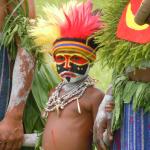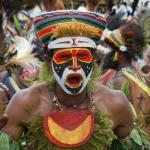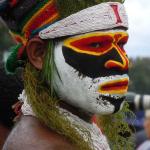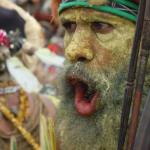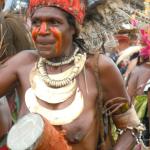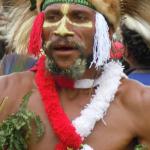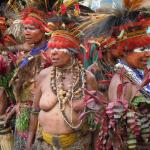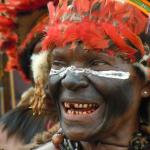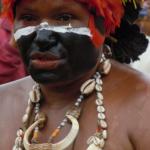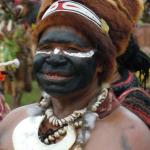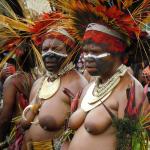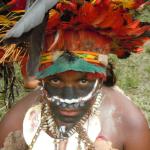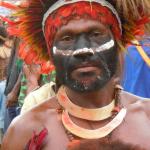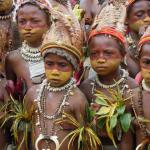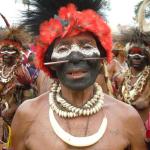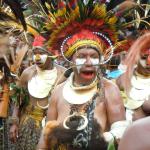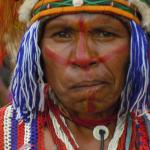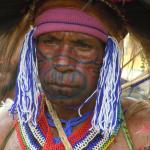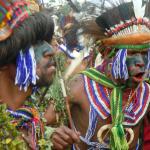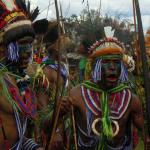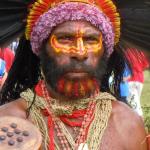© 2011 Sabrina Swenson. All Rights Reserved.
Papua New Guinea
September, 2012
September, 2012
September, 2012
September, 2012
A trip to Papua New Guinea is like a step back in time. My usual planning of a trip in advance was made difficult by the limited amount of current information available about the country. When I would e-mail or make phone calls to inquire about certain aspects of the trip, invariably the phone number would be disconnected or the e-mail address would be invalid. I wasn't able to do much planning in advance and so I just stepping into the great unknown and winged it as I went.
Papua New Guinea is located just North of Australia on the Eastern half of the island of New Guinea. The Western half belonging to Indonesia. The country gained full independence from Australia on September 16, 1975.
I arrived into Port Moresby, a capital city with a notoriously bad reputation and spent only one night. Port Moresby is definitely not the highlight of a trip to PNG and so a quick night spent, I hopped on Air Nuigini, the national carrier, for a flight up to Tari in the highlands. Papua New Guinea (PNG) is probably more reliant on air travel than any other country in the world. The population is scattered and the terrain rough. Driving is simply not an option in many parts of the country. I arrived into the tiny airport of Tari and thought the two thatch roofed circular huts erected as an arrivals and departure lounge were a brilliant idea. As I walked past them and on into the airport I found a dingy building jam packed with boxes, bags and a whole lot of dust. It was cluttered, dirty and looked like a neglected shack! I looked around and asked the lady in the Air Nuigini uniform "Is this the airport?" Yes, she responded. I had never seen such a ram-shackle airport in my life. I realized finding a ride to the hotel I had picked out of my book was not going to be easy given there were no passenger facilities what-so-ever. Since the number for the lodge I had did not work, I asked different employees how I could get out to the Wari Lodge which was about 45 minutes outside of town. PMV's (Public motorized vehicles) are the usual method of transport. They are basically big trucks with an open bed in the back. The trucks slow down and they yell their destination. If it's headed where you want to go, you just hop in and pay. Since no PMV went directly past my lodge this was not an option, especially since I did not know my way around the area. After much asking around the airport manager felt sorry for me and offered to drive me after he was finished with his work. A short time later I climbed into his SUV decked out in metal wire mesh over every inch of the windows. I've never seen such a thing in all my travels. When I inquired about it, he said there were "bandits" (robbers) who would break your windshield and steal your money and belongs. As I looked around, most of the vehicles I saw also had the metal webbing. We bounced along a dirt road for 45 minutes in the beating rain until we arrived at Wari Lodge. I was greeted by a man with an umbrella and a big smile. I thanked the airport manager and walked into Wari Lodge. Named after the owner's last name, his staff were the only two people present, neither of which spoke English. PNG has more languages than any other country in the world with a whopping 820 plus! Although English is the official language with government and education being conducted in the language, still, many people do not speak it. I looked around the thatched huts that made up the lodge. There were only four rooms in addition to a big hut for cooking and eating and the shower and toilet facilities hut. It was a simple beauty and so appropriate in amongst the natural habitat. I tried to explain what I wanted to no avail. Finally a young girl of nine arrived and spoke near perfect English. She was the daughter of the owner (who was not around) and helped me every day during my stay in Tari. Although she was only nine, she was intellectually wise beyond her years. No matter what I required, Lydia could produce. I settled into my room; a simple but pleasant place made completely of bush material. There was no electricity at Wari Lodge except for when the generators were running. With no other guests Lydia asked what I would like for dinner, upon giving her some money she ran off in search of the components for my meal. She came back with the goods huffing and puffing from the run and gave me my change. She said the cook would have my meal ready whenever I wanted to eat. She also arranged a guide to take me to some of the sights I wanted to see in the area. Later that evening, still in the pouring rain I went to the main hut for dinner. I watched as the chef cooked my dinner over a fire in the middle of the hut. The result was a delicious chicken curry with vegetables and rice all perfectly cooked. When I asked for some water he grabbed a pitcher and went outside to the huge tank which had been catching rain water all day and scooped out a pitcher for me. With so much rain in PNG the land is very green and fertile. I learned they never hurt for food or water as they can grow many things and there is always a fresh supply of water. I noticed large containers all over the country collecting rain water. When it came time to retire for the day I went to the bathroom hut not expecting much in the way of "facilities" but was pleasantly surprised when I saw a real toilet in the middle of the hut which actually worked! There was also a real sink. I retired for the night and slept soundly in the cool climate of the highlands.
When I woke the next morning the downpour had finally stopped and I went outside to have a look at the area in the clear air. Wari Lodge is set high on a hill and has a stunning view of the valley below. It was a perfect location. I had a simple breakfast and coffee and then my guide turned up. I asked if it was possible to have a mumu which is basically a feast cooked in an underground pit. He arranged for two pigs and vegetables for the mumu that afternoon. We went off hiking and to see a spectacular waterfall and some other highlights of the highlands. One of the things I saw again and again in the highlands was the locals favorite pastime... darts! Men all over could be seen playing darts on board set up everywhere including the side of the road and at the market. I also consistently saw what appeared to be blood splattered all over the ground in numerous areas. I thought, what kind of brutal country is this? Upon asking my guide, I was informed the red splatter was definitely not blood but rather came from someone spitting out betle nut juice. Betel nut; the seed of the betel palm, is chewed with leaves and is a mild stimulant. It turns the inside of a persons mouth and their teeth a bright red and when they spit, it looks like a splatter of blood. When we finally returned later in the day the mumu was about to begin directly behind my hut. Although I know where pork comes from I didn't want to be present for the killing of the pigs. I told them to let me know when that part was over. I returned to my room for a short time until with my window open, I smelt the worst smell in the world. When I looked out my window I saw pig number one already killed, having it's hair burnt off. A flash back of singeing my bangs whilst blowing out birthday candles as a kid came to mind although this stench was about a hundred times worse! Luckily it didn't last long for as soon as the hair was completely gone, so was the smell. By the time I walked out pig number two was well underway and they had already expertly cut them up. Given how perfectly this had been performed it was obvious they had done this many times before. Each organ was laid out perfectly in tact all ready to be cooked. The pit was dug and hot rocks were put on the bottom. This was followed by ferns, the pigs and vegetables, banana leaves, the rest of the soil and finally a big tarp followed by more soil on top of that. The whole thing was left to cook for an hour before being dug up. Lydia was there to help with the digging. This hard working jack-of-all-trades kid I'm sure could easily fend for herself in the world if need be. With both pigs and vegetables dug up the extended Wari family showed up. This feast was far more than I could have ever possibly eaten and so I was happy to be able to feed so many people. When I inquired who everyone was I was told "that's the owners wife and his kids and that's the owner's other wife and kids and that's his other wife and kids". I learned taking multiple wives is perfectly acceptable in PNG. When I asked if a woman could take many husbands I was just greeted with a confused look and an "I guess so". Apparently no one had ever asked that before. Each wife and children were given an equal portion. As for me I was distracted by the garish looking pig tail that was now crispy black and resembled a rat's tail. I saw a young boy pick it up and just as I was thinking how awful it looked he looked straight at me and smiled big. I realized immediately the "prized possession" was coming straight for the guest of honor.... me! I accepted it happily and although I'm not a picky eater I thought, how am I going to get this thing down! I nibbled on part of the base of the tail which was the animal's hind quarter. Finally the guide I had hiked with that day, sensing my hesitation took it from me and crunched the whole thing down in two seconds. I was relieved and a large hunk of the pig's back was given to me to eat. This was a huge piece, very hot and quite tasty. We all stood around eating and finally the many wives and their children went back to their nearby huts taking copious amounts of meat with them.
When it came time to leave Tari I asked about transportation back to the airport. Since there were no taxis and since no one in the area had a vehicle the guide said he would walk with me to where the PMV would take me back to town. I packed up my 40 pound backpack and walked seven miles with the guide to the PMV stop. He offered to carry my bag many times but since he was barefoot (as most people are) I couldn't let him carry my heavy bag especially since we were walking on gravel. On our way I turned around at one point to see a heard of kids behind us. Since it was early in the morning, everyone was walking to school. Lydia was one of them and she also offered repeatedly to carry my bag. Again, I was not going to let her with her bare feet and tiny nine year old frame carry my heavy bag. When we finally got to the school I found it to be a nice, well-built building. Tons of kids of all ages where arriving and I was happy to learn that education is free in PNG. I thanked and waved goodbye to Lydia and continued the walk to the PMV. The large truck eventually arrived and they made room for me in the cab. I paid the driver and off I went to Tari. I hopped out as we drove past the airport and waited in the slow moving line for the flight to my next destination, Mt. Hagen which is also in the highlands. After much waiting Air Nuigini, known for its unreliable schedule, canceled their only flight that day due to a mechanical problem. With no other Air Nuigini flights out of Tari everyone moaned and groaned and stomped off complaining about the cancellation and the need to wait another 24 hours for their flight. I looked around the airport for an alternative and saw a tiny hanger across the field with the letters MAF. I knew from my guidebook that this stood for Missionary Aviation Fellowship. After looking around the tarmac and field and not seeing anyone that would tell me I couldn't, I walked across the tarmac straight for the MAF hanger. It was surrounded by a big fence and so I yelled for someone to come out and let me in. I asked if they had a flight to Mt. Hagen that day and they did later in the afternoon. I asked if they took passengers and since they did, I hung out at the hanger all day waiting for the flight. I watched as many MAF planes came and went mostly filled with supplies. I even saw a load of baby chicks arrive in containers with big air holes. With PNG being rich with natural resources, I also saw endless helicopters bringing in and picking up men to work for the foreign mineral and gas companies. When my flight finally arrived it was mostly meant for cargo although there were a few other passengers going as well. The plane looked normal from the outside but once inside I couldn't help but wonder how old it actually was. With flip down seats and antiquated seat belts, not to mention no heat in the freezing altitude I shivered for the 40 minute flight until we landed in Hagen. Once there I took a PMV into town. I was going to walk from the PMV station to my hotel but the college age girl next to me mentioned I shouldn't walk alone since it was after 6pm. She insisted that she, her little bother, mother and grandmother (all in the PMV) would walk me to my hotel. Since most towns in PNG are not safe for females to walk around solo after dusk she took it upon herself to make sure I got to where I wanted to go safely. I said I'd be fine but she absolutely insisted. Her kindness and thoughtfulness was touching. Upon leaving me at the doorstep of my hotel she and the rest of her family all hugged me before walking back to the PMV stop and continuing on in the opposite direction to their home.
I checked in and after a couple uneventful days in this not-so-pretty town I headed to the PMV station to catch a vehicle to Goroka, a small town about a four hour drive from Hagen. The PMV station was a filthy place with no organization what-so-ever. Minivans and trucks were haphazardly parked in the area each with the driver yelling out their destination. I found a minivan to Goroka and waited about an hour for the vehicle to fill up as vehicles never go unless every seat is filled. I was happy to be underway and other than the cramped quarters, had a pleasant and beautiful drive the four hours to Goroka. I hopped out in the middle of town and couldn't help but see the main structure in this tiny highlands town, the airport runway. With one fairly large runway smack in the middle of town and only a few shops and stores along it's edges Goroka most times of the year is a sleepy town. Every year over PNG's independence day, however, Goroka is home to the biggest social event of the year and the main reason I came to PNG. Every Independence day weekend hundreds, if not thousands of locals and some tourists come to this tiny place for the Goroka show. It's a traditional sing-sing, in which tribes from the highlands gather to show off their distinct culture, dance and music, dressing in elaborate costumes, sky-high headdresses and painted faces. For two days this show goes on and it is the highlight of the social calendar. I arrived early and watched tribe after tribe arrive each in their individual groups most smiling from ear to ear singing and dancing their way past. It was a photographers dream. Over a hundred tribes showed up and their bright, colorful outfits and painted faces kept arriving, each group different from the last. There were grass skirts, bird-of-paradise feathers (indigenous to PNG) and even grass reeds and feathers through some noses. The air was filling with songs and drums. With faces like these only seen in the pages of the likes of National Geographic, it was another world.
A few days later I left on that big runway out of Goroka and back to the capital of Port Moresby before continuing on my way back home. Although PNG certainly isn't the easiest country to get around, it was definitely worth the effort. I thoroughly enjoyed my time there. The Goroka Sing-Sing is such a special event to witness. There's really nothing else like it on earth. Not in this day and age anyway!
I

